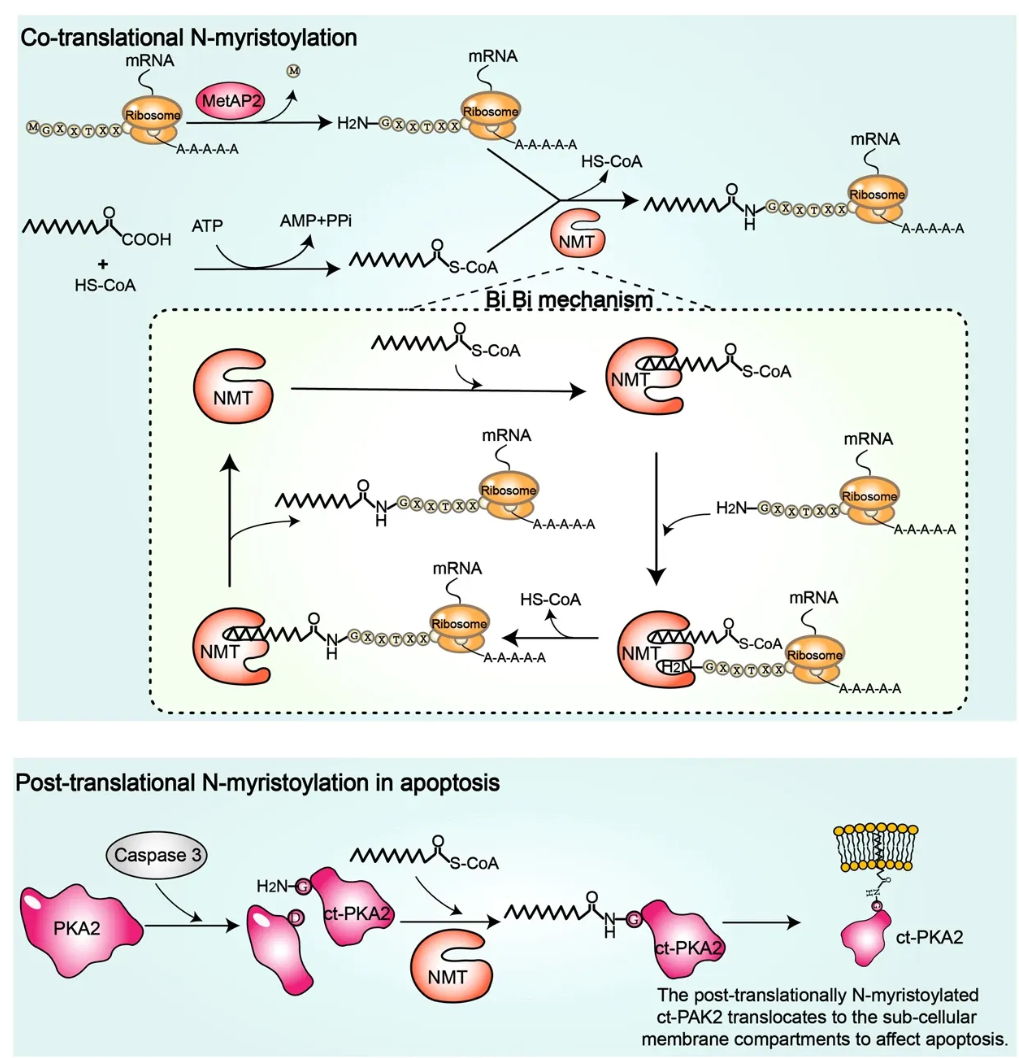N-myristoylation Analysis Service
N-myristoylation is a lipid modification widely distributed among eukaryotic organisms and viruses, in which a myristoyl group is covalently attached to specific protein residues. This modification regulates protein localization, stability, and interaction, thereby influencing cellular signaling, apoptosis, and pathogen-host dynamics. As a critical regulatory mechanism involved in immune responses, oncogenesis, and infectious processes, N-myristoylation has become a major focus of biomedical research. MtoZ Biolabs provides a dedicated N-myristoylation Analysis Service that integrates advanced proteomics technologies with optimized enrichment and validation strategies. To meet different research goals, we offer two complementary analytical solutions:
💠 Target Protein N-myristoylation Analysis
This service focuses on a single protein of interest, enabling confirmation of N-myristoylation, identification of modification sites, and preliminary functional assessment.
💠 N-myristoylation Proteomics
This proteome-wide analysis allows large-scale identification and characterization of myristoylated proteins, providing insight into global modification patterns and their functional implications.
What is N-myristoylation?
N-myristoylation is a lipid modification mediated by N-myristoyltransferase (NMT), an enzyme that catalyzes the attachment of a 14-carbon saturated fatty acid (myristic acid) to the amino group of the N-terminal glycine. This process usually occurs co-translationally after the removal of the initiator methionine. In some cases, N-myristoylation can also occur post-translationally, often in response to proteolytic cleavage events that expose an internal glycine.
This modification plays multiple roles in cellular biology. It promotes membrane association of proteins, regulates protein-protein interactions, and stabilizes protein conformation. Proteins subject to N-myristoylation include kinases, phosphatases, apoptotic regulators, and viral proteins.

Wang, B. et al. Cellular & Molecular Immunology, 2021.
Figure 1. The Molecular Mechanism of Protein N-Myristoylation Catalyzed by N-Myristoyltransferase (NMT)
Research has demonstrated that dysregulation of N-myristoylation contributes to human diseases. Aberrant NMT activity has been implicated in cancer progression, neurodegenerative conditions, and infectious diseases. NMT inhibitors are under investigation as therapeutic agents against parasites such as Plasmodium and Leishmania, as well as certain viral infections. Advances in proteomics and chemical biology have enabled systematic identification of N-myristoylated proteins, highlighting their importance as biomarkers and drug targets.
Analysis Workflow

Sample Submission Suggestions
1. Sample Types
We accept various biological sample types, including but not limited to:
- Cultured cells
- Microorganism Samples
- Animal or human tissue
- Plant tissue
- Biological fluids such as plasma or serum
- Protein Extracts
2. Storage and Transport
- Samples should be snap-frozen in liquid nitrogen and stored at –80°C until shipment.
- Ship samples on dry ice.
- Avoid repeated freeze–thaw cycles.
*Note: If you have special sample types or require additional guidance, please contact us for personalized support before sample preparation.
Service Advantages
✔️Advanced Analysis Platform
An advanced N-myristoylation Analysis Service platform guarantees reliable, fast, and highly accurate results.
✔️Specialized Enrichment Methods
Use of chemical probes and affinity-based techniques to enhance detection specificity.
✔️Customizable Solutions
Flexible design for global profiling or targeted validation, based on client objectives.
✔️Experienced Team
Expertise in lipid modifications, proteomics, and bioinformatics supports clients through every stage of the project.
Applications
Our N-myristoylation Analysis Service supports a broad range of applications:
1. Signal Transduction Studies
Understanding how N-myristoylation regulates protein localization and signaling pathways.
2. Cancer Research
Investigating dysregulated NMT activity and its contribution to tumorigenesis.
3. Infectious Disease Research
Identifying viral and parasitic proteins that depend on N-myristoylation for replication and pathogenicity.
4. Neurodegeneration
Exploring the role of N-myristoylated proteins in neuronal survival, apoptosis, and disease progression.
5. Biomarker Discovery
Detecting myristoylation signatures in disease models and clinical samples.
6. Drug Development
Supporting therapeutic strategies targeting NMT or N-myristoylation-dependent proteins.
Deliverables
1. Comprehensive Experimental Details
2. Materials, Instruments, and Methods
3. The Detailed Information of N-myristoylation Analysis
4. Mass Spectrometry Image
5. Bioinformatics Analysis
6. Raw Data
MtoZ Biolabs' N-myristoylation Analysis Service integrates enrichment, high-resolution mass spectrometry, and bioinformatics interpretation, delivering reliable and actionable data to support your scientific and translational goals. Contact us to explore tailored solutions for your research.







